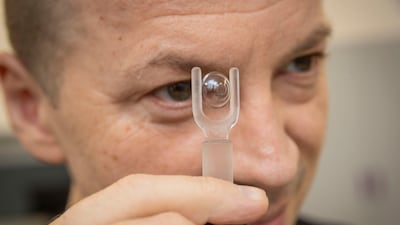Xpanceo, a Dubai-based start-up, has unveiled prototypes of its smart contact lens, which aims to mimic the technology featured in the Iron Man films, its founder and managing partner has said.
The company, which in October raised $40 million in a seed funding round, plans to put the device on shelves by 2027 after human trials that are scheduled to be conducted within two years, Roman Axelrod told The National on Wednesday.
"It usually takes from half a year to several years [to conduct human trials]. After that, they will be on shelves, I would say [by] 2027 or 2028, in optical stores," he said.
Xpanceo introduced three prototypes, which will provide an "infinite" extended reality view in which tasks from documents to meetings and social media to gaming will be shown on the user's field of view and are visible only to the wearer.
The lens, which is powered by artificial intelligence and machine learning, will also include night vision functionality and can be controlled using voice, gestures, glances and, "probably later, your mind", Mr Axelrod said.
The company is also developing a charging case for the lens similar to those used by wireless earbuds.
Ultimately, the goal is to attempt to replace all the devices consumers currently use and roll them all into a hyper-miniaturised gadget, Mr Axelrod said.
"Now, we have our laptops for the office, smartphones for daily activities and smartwatches for training ... a real computer of the future is an ecosystem of software. Think about it as a Tony Stark computer," he said, referring to the civilian identity of Marvel's highly popular comic book character.
Xpanceo has yet to determine a price for its smart contact lens, but "it has to be no more than an expensive smartphone", Mr Axelrod said.
That would imply four figures in dollar terms; for reference, the most expensive version of the latest iPhone 15 Pro Max is priced at $1,599 in the US.
Miniaturising technology has become increasingly sophisticated with advancements in development and innovation. Smartphones, especially the top end models, are smaller versions of computers.
Developers of these technologies aim to make technology more convenient and accessible without the need to use multiple devices.
The augmented reality sector is gaining traction with the introduction of new headsets, with arguably the most notable coming from Facebook parent Meta Platforms.
However, efforts have not always succeeded. Google, for instance, pulled the plug on its Project Iris AR glasses project in June after efforts to develop the device reportedly went awry.
Xpanceo is not the first company to develop a smart contact lens but is keen on pushing forth with its device and pick up from where others have failed.
California-based Mojo Vision spent years developing a lens, but in January this year, decided to pivot to just developing micro-LED technology while laying off three quarters of its staff.
"We'll definitely build a lab to hire the best talent, expand our product management activities and build up prototypes, and file and secure patents," Mr Axelrod said.
Xpanceo does not have plans to raise more funds soon. "We have enough," Mr Axelrod said. However, he said the company may revisit this option in two or three years, citing investor interest.
"They saw some of the brightest minds ... and transparent plans as to how to develop this gadget," he said.
Xpanceo plans to eventually introduce subscription plans for their smart contact lens, replacing the traditional contact lens depending on their lifespan – weekly, fortnightly and monthly.
Failure to follow the replacement cycle of contact lenses can cause serious eye conditions, and they should still be replaced per schedule even if they are not worn regularly, according to the Cleveland Clinic.
The company plans to send replacement lenses to users to adhere to these replacement cycles and will provide cleaning solutions for their products, Mr Axelrod said.










